The tooth fairy is a welcome guest for any child who has lost a tooth. Not only will the fairy leave a small gift under the child’s pillow, but they be assured of a replacement tooth in a few months. Unfortunately, the scenario is quite different for adults grappling with a loss of teeth. Luckily, there may be some hope thanks to a new study performed by scientists at Kyoto University and the University of Fukui.
A dental breakthrough
While the typical adult mouth houses 32 teeth, approximately 1% of the population exhibits variations of them, either possessing more or fewer teeth due to congenital conditions. Researchers have delved into the genetic factors behind cases of excessive teeth, seeking valuable insights into the potential regeneration of teeth in adults. This study is the first to show that monoclonal antibodies can help regrow teeth. It suggests a new way to treat a dental problem that currently requires implants and other artificial solutions.
A bit of science
The research team disclosed that an antibody targeting a specific gene, known as uterine sensitization-associated gene-1 (USAG-1), can induce tooth development in mice affected by tooth agenesis, a congenital condition. The findings were published in the journal, Science Advances.
As per Katsu Takahashi, a senior lecturer at the Kyoto University Graduate School of Medicine and one of the principal contributors to the study, the essential molecules crucial for the development of teeth have already been pinpointed. “The morphogenesis of individual teeth depends on the interactions of several molecules including BMP, or bone morphogenetic protein, and Wnt signaling,” says Takahashi.
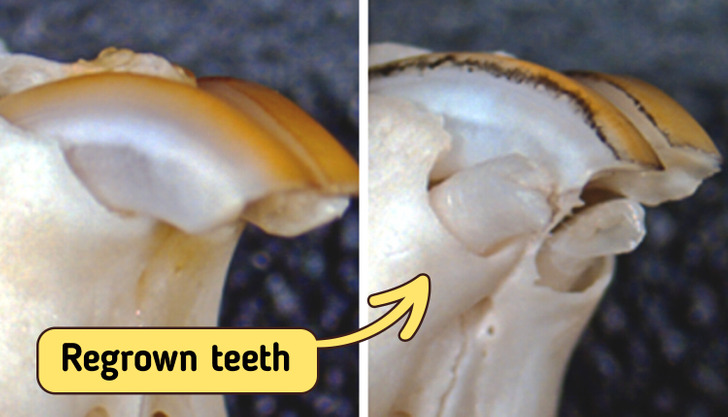
On April 13, 2021, the University of Kyoto posted its first pic of newly-grown teeth in mice.
BMP and Wnt are involved in more than just tooth development; they affect the growth of organs and tissues early in the body’s development. Because drugs affecting them directly might have broad side effects, scientists are cautious. To find a potentially safer method, researchers focused on the gene USAG-1, thinking that aiming at factors countering BMP and Wnt specifically in tooth development could be more precise.
“We knew that suppressing USAG-1 benefits tooth growth. What we did not know was whether it would be enough,” added Takahashi.
The first results
Scientists looked at how different monoclonal antibodies affect USAG-1. Monoclonal antibodies are often used to treat things like cancer and arthritis and for making vaccines. Tests with this antibody showed that BMP signaling is crucial for deciding the number of teeth in mice. Also, just one treatment was enough to grow a whole tooth. Further tests confirmed these positive results in ferrets too.
“Ferrets are diphyodont animals with similar dental patterns to humans. Our next plan is to test the antibodies on other animals, such as pigs and dogs,” explained Takahashi.
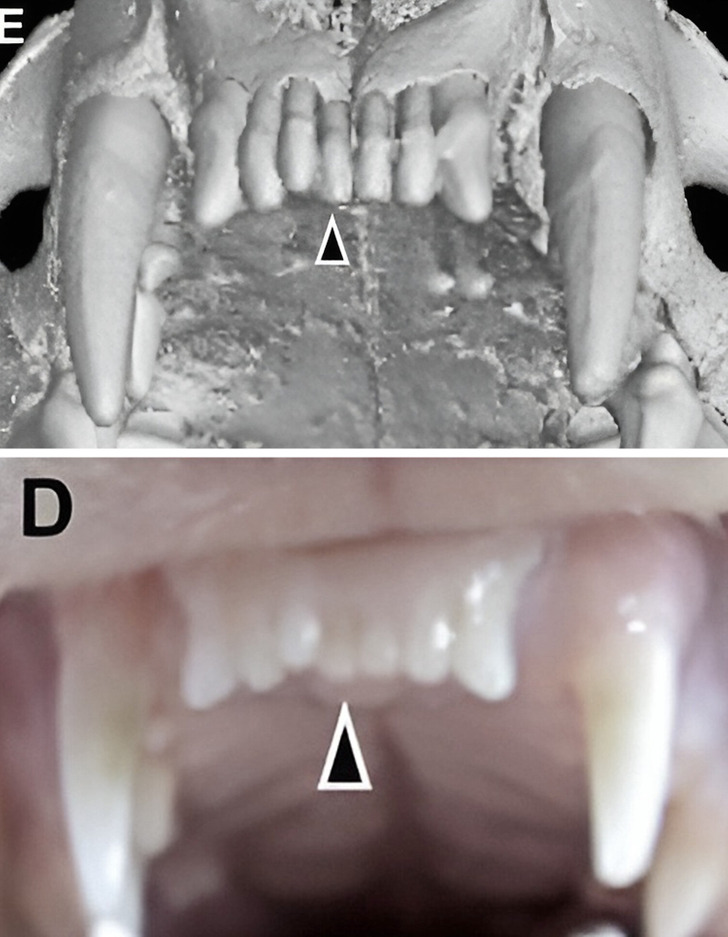
Fully regrown frontal teeth in ferrets
The next steps
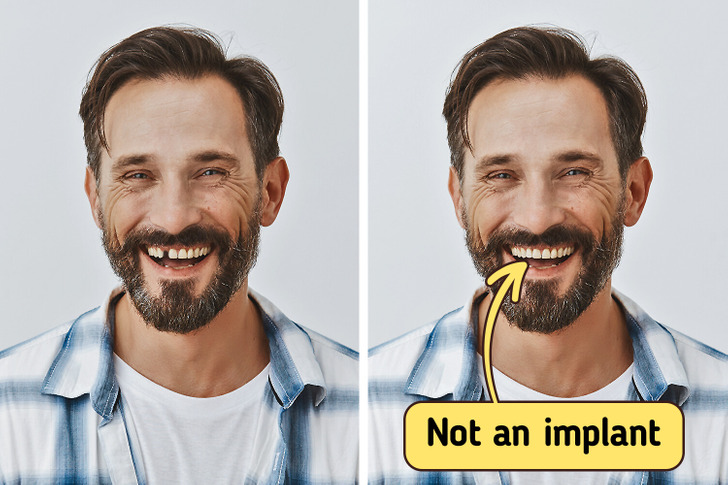
Now, scientists are going to test the drug on healthy adults. If that goes well, the team plans to try it on kids aged 2 to 6 with a rare tooth problem called anodontia, a genetic disorder defined as the absence of all teeth. These kids will get one shot of the drug to see if it makes their teeth grow. If everything works out, the medicine might be approved by 2030.
Takahashi sees the new medicine as an additional choice for individuals who are missing some or all of their teeth.
“The idea of growing new teeth is every dentist’s dream,” Takahashi told the Japanese newspaper, The Mainichi in June this year. “I’ve been working on this since I was a graduate student. I was confident I’d be able to make it happen.”
So hopefully, by the year 2030, humans will get a chance to have their third generation of teeth grown and say goodbye to implants. Until then, make sure to keep your teeth strong and healthy — this article will help you with that.
Preview photo credit KyotoU_News / Twitter
Minha sogra exigiu que eu devolvesse meu anel de noivado porque ele “pertencia ao lado dela da família”

Quando meu marido me pediu em casamento, ele me deu um lindo anel vintage que estava na família dele há gerações. Mas a mãe dele decidiu que não era meu para ficar com ele. Ela exigiu de volta, e eu o entreguei, atordoada demais para discutir. Pensei que era o fim… Eu estava errada.
Quando Adam me pediu em casamento com o anel vintage mais lindo que eu já tinha visto, pensei que estava vivendo um conto de fadas. A delicada faixa de ouro, a safira azul-escura e os pequenos diamantes emoldurando-a perfeitamente a tornaram deslumbrante, atemporal e absolutamente minha… até que sua mãe exigiu que eu a devolvesse porque “pertencia à família dela”.
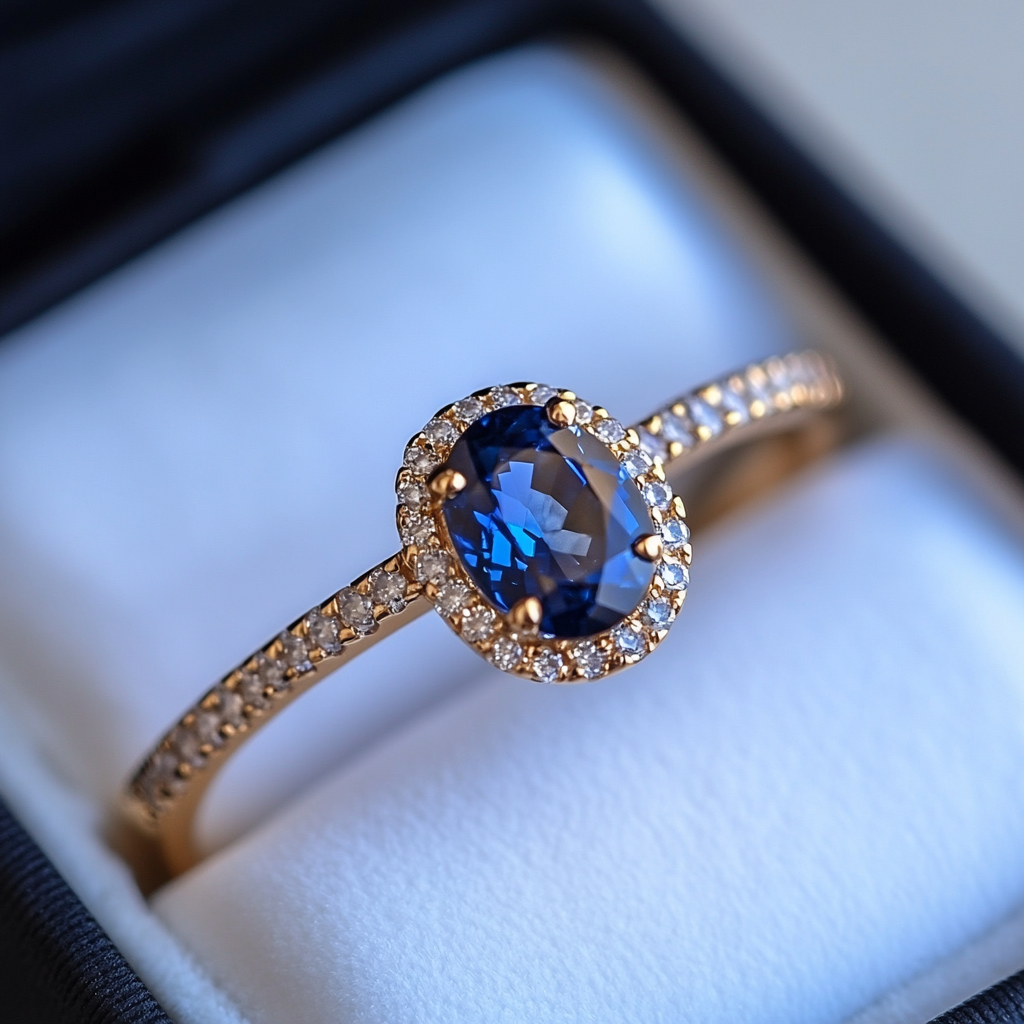
Um anel deslumbrante em uma caixa | Fonte: Midjourney
Adam e eu estávamos casados há seis meses, e a vida parecia boa. Nosso pequeno apartamento estava lentamente se tornando um lar, e nós caímos em um ritmo confortável juntos.
Todas as manhãs, eu pegava a luz do sol batendo no meu anel enquanto eu fazia café, e sorria, lembrando do dia em que ele nervosamente se ajoelhou. Era mágico.
Então, numa agradável noite de sexta-feira, fomos jantar na casa dos pais dele. Eu usei o anel, como sempre. No momento em que entramos, notei minha sogra Diane olhando para minha mão, seus olhos se estreitando levemente.
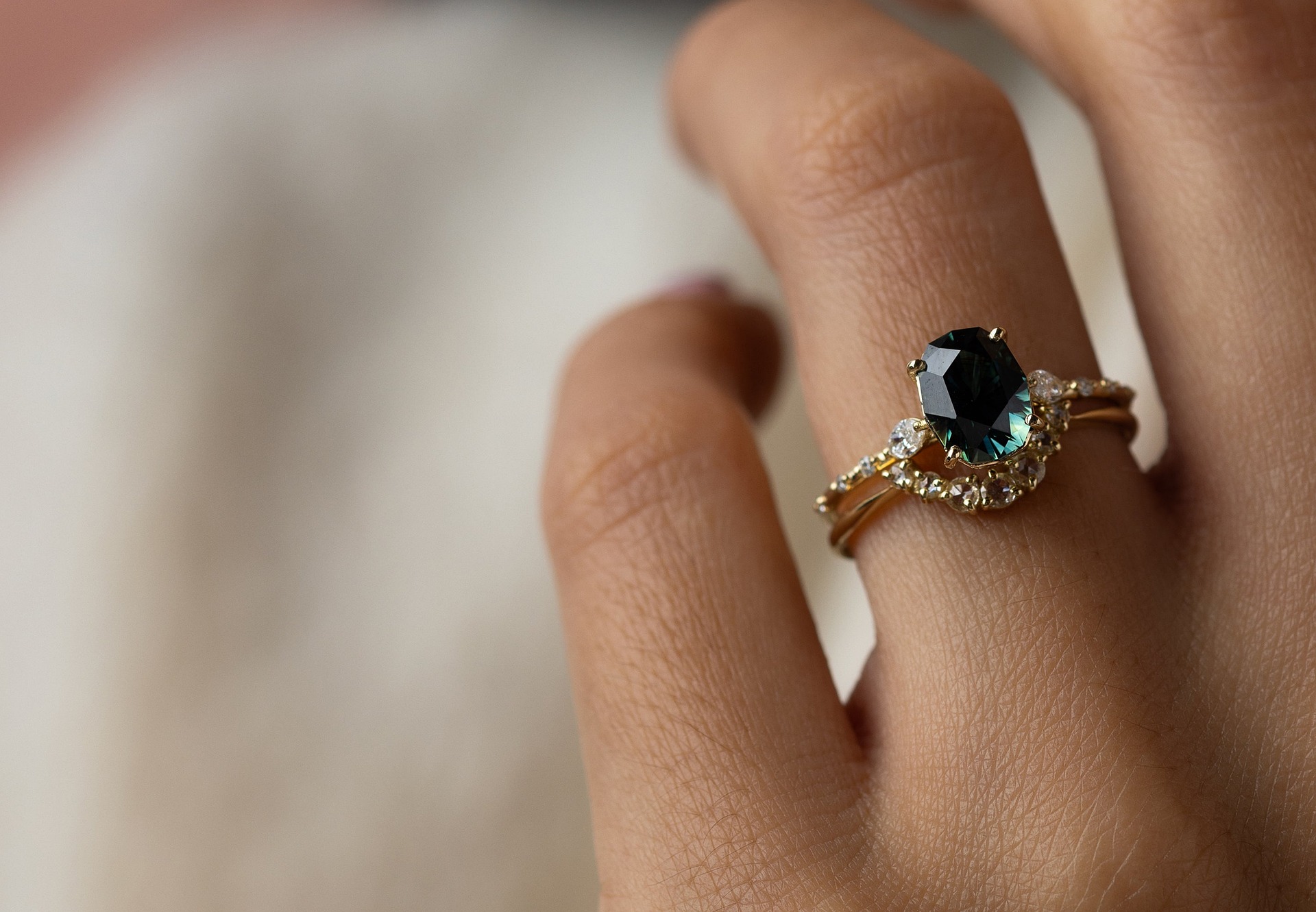
Close-up de uma mulher usando um anel de safira | Fonte: Pixabay
Apertei a mão de Adam e sussurrei: “Sua mãe parece estranha esta noite.”
“Ela está bem”, ele disse, beijando minha bochecha. “Papai fez o assado favorito dela. Ela provavelmente está com fome.”
Mas senti seus olhos em mim durante toda a noite, seguindo minha mão esquerda sempre que eu pegava meu copo de água ou gesticulava durante a conversa.

Uma mulher idosa olhando severamente para alguém | Fonte: Midjourney
No meio do jantar, Adam e seu pai Peter se levantaram para verificar o assado no forno. Assim que eles estavam fora do alcance da voz, Diane se inclinou sobre a mesa em minha direção.
“Você está gostando desse anel?” Sua voz era doce, mas seus olhos eram frios.
Pisquei, confusa com a pergunta repentina. “Claro… Adam me deu.”

Uma mulher confusa | Fonte: Midjourney
Ela me deu um sorriso apertado e cheio de pena que fez meu estômago apertar. “Oh, querida. Ele fez. Mas esse anel está na nossa família há gerações. Da minha avó. Não é uma pequena bugiganga destinada a acabar na mão de… bem, alguém como VOCÊ.”
Meu rosto queimou como se ela tivesse me dado um tapa. “Alguém como EU?”
“Vamos ser honestos”, ela continuou, dobrando o guardanapo com precisão. “Seu lado da família não tem exatamente relíquias de família. Você não é… bem, você não é exatamente o tipo de mulher que passa coisas assim adiante. Elas pertencem a nós. Onde realmente importam.”

Uma mulher frustrada carrancuda | Fonte: Midjourney
Fiquei paralisado, as palavras me atingindo como pequenos dardos. Então, tão casualmente como se estivesse me pedindo para passar o sal, ela estendeu a mão.
“Vá em frente e devolva agora. Eu o manterei seguro.”
Eu não sabia o que dizer, e não queria uma cena. O jeito que ela disse isso — como se fosse óbvio que eu não merecia isso — me fez sentir pequeno e insignificante.
Então tirei o anel do meu dedo, coloquei-o sobre a mesa e pedi licença para ir ao banheiro antes que alguém visse as lágrimas brotando.

Um anel colocado sobre a mesa | Fonte: Midjourney
“Não mencione isso ao Adam”, ela gritou para mim. “Isso só o deixaria chateado, e não há necessidade disso.”
Fiquei naquele banheiro pelo que pareceu uma eternidade, olhando para meu reflexo no espelho. O ponto descoberto no meu dedo parecia errado, como um dente faltando que você não consegue parar de passar a língua.
“Se recomponha”, sussurrei para meu reflexo. Meus olhos estavam vermelhos, mas joguei água fria no rosto até parecer um pouco normal.

Uma mulher emocionada em um banheiro | Fonte: Midjourney
Quando voltei para a sala de jantar, Adam me lançou um olhar preocupado.
“Está tudo bem?”, ele perguntou, pegando minha mão por baixo da mesa.
Eu assenti, mantendo cuidadosamente minha mão esquerda escondida no meu colo. “Só uma dor de cabeça.”
Diane sorriu para mim do outro lado da mesa, o anel não estava à vista. “Pobrezinha. Você gostaria de uma aspirina?”
“Não, obrigada”, eu disse, forçando um sorriso. “Eu vou ficar bem.”

Um homem sorridente sentado à mesa de jantar | Fonte: Midjourney
O jantar continuou como se nada tivesse acontecido. Peter falou sobre seu jogo de golfe. Adam discutiu um projeto no trabalho. Eu empurrei a comida pelo meu prato, mal sentindo o gosto de alguma coisa.
No caminho para casa, Adam continuou olhando para mim. “Você está quieto esta noite.”
“Só estou cansado”, eu disse, olhando pela janela, minha mão esquerda dobrada sob a direita.
“Mamãe parecia estar se comportando muito bem pela primeira vez”, ele disse com uma risada. “Normalmente ela encontra algo para criticar em todo mundo.”
Mordi meu lábio com força. “É. Ela sempre tem… alguma coisa.”

Uma mulher desanimada sentada em um carro | Fonte: Midjourney
Quando voltamos para casa, fui direto para a cama, alegando exaustão. Enquanto Adam se retirava para assistir futebol na TV, eu me enrolei sob as cobertas, olhando para meu dedo nu onde o anel uma vez ficou.
Lágrimas deslizaram silenciosamente pelas minhas bochechas. O que eu diria a Adam se ele perguntasse sobre o anel? Como eu poderia reclamar sobre sua mãe para ele?
Eu não queria que ela me culpasse por mais drama ou me acusasse de criar uma divisão entre mãe e filho. Eu estava preso e infeliz.

Uma mulher triste perdida em pensamentos profundos | Fonte: Midjourney
O colchão afundou quando Adam subiu na cama horas depois. Ele passou um braço em volta de mim, e eu fingi estar dormindo, com medo de que ele notasse meu dedo sem anel.
“Te amo”, ele murmurou contra meu cabelo.
Fiquei acordado a maior parte da noite, me perguntando como algo tão pequeno podia me fazer sentir tão inútil.
Na manhã seguinte, desci e encontrei um bilhete de Adam na geladeira: “Trabalho urgente. Até mais! Amo você.”

Um post-it colado em uma geladeira | Fonte: Midjourney
Suspirei aliviada. Pelo menos não precisei mencionar o anel naquela manhã e estragar o humor dele.
Mas o que eu diria quando ele finalmente percebesse? Que eu o perdi? Que ele escorregou? A ideia de mentir para ele me deixava doente, mas a ideia de lhe contar a verdade era pior.
O dia todo, eu me movi pela casa como um fantasma, ensaiando explicações na minha cabeça, cada uma soando mais patética que a anterior. Conforme a noite se aproximava, ouvi uma porta de carro bater lá fora. Meu coração disparou.

Um carro na garagem | Fonte: Unsplash
Quando abri a porta, meu marido não estava sozinho. Ao lado dele estava seu pai, Peter. E na mão de Peter estava uma pequena caixa de veludo para anéis.
Meu coração pulou na garganta.
“Podemos entrar?” Adam perguntou, com uma expressão ilegível.
Os dois entraram, e Peter colocou a caixa na mesa de centro como se ela pesasse 45 quilos.
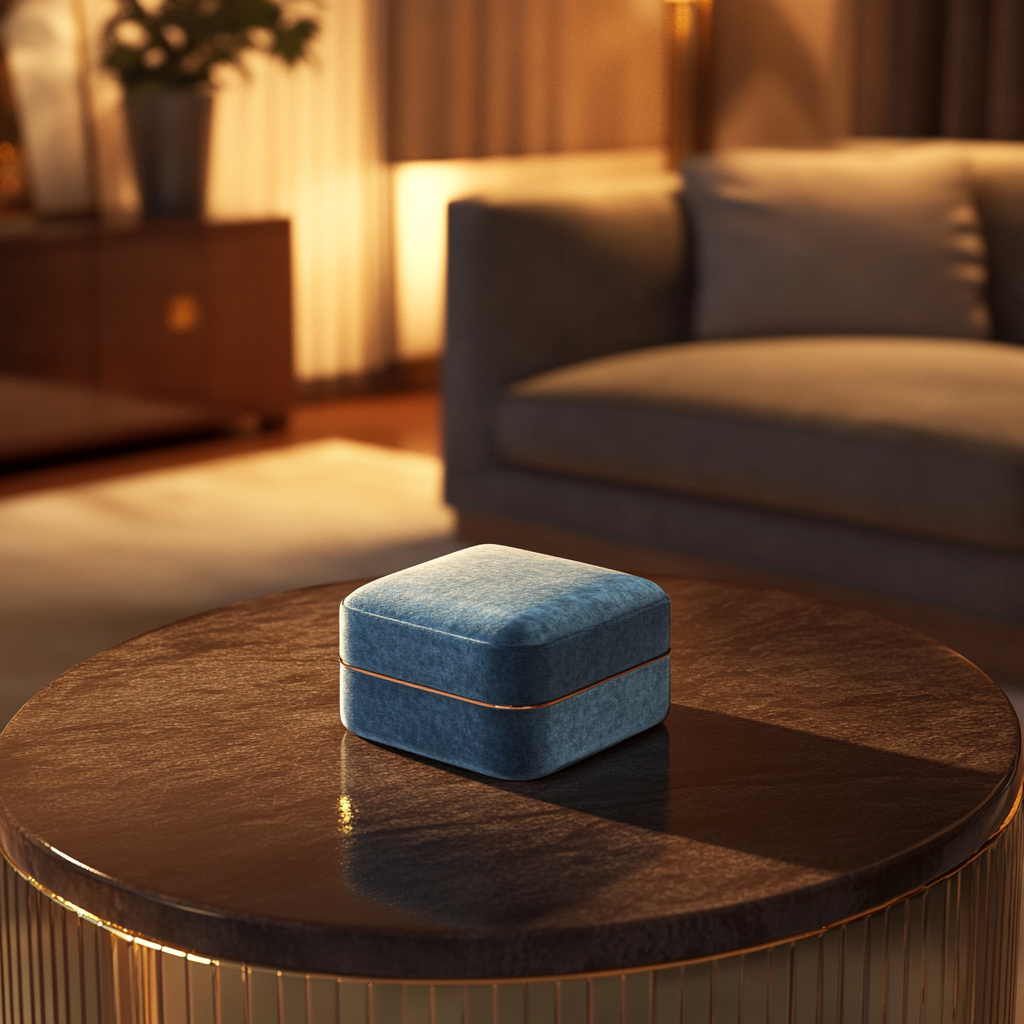
Uma caixa de veludo sobre uma mesa | Fonte: Midjourney
Ninguém falou por um longo momento. Então Peter limpou a garganta.
“Eu vi o anel na mão de Diane ontem à noite e sabia exatamente o que ela estava fazendo”, ele disse, seu rosto normalmente jovial sério. “E eu não estava aceitando. Liguei para Adam esta manhã.”
O maxilar de Adam se apertou. “Papai me contou tudo. Por que você não disse nada, Mia?”
Olhei para minhas mãos. “Eu não queria causar problemas. Ela me fez sentir como… como se eu não merecesse isso.”
“Isso é ridículo”, disse Adam, sua voz aumentando. “Eu te dei esse anel porque eu te amo. Ele é seu.”

Um homem irritado | Fonte: Midjourney
Peter assentiu. “Depois que vocês dois saíram, eu confrontei Diane. Ela admitiu ter encurralado você e feito você devolver o anel.” Seu rosto escureceu. “Ela não achou que você deveria ter algo tão ‘valioso’ considerando ‘de onde você veio.’”
Minhas bochechas queimaram com a lembrança da humilhação.
“Mas eu não queria nada disso”, Peter continuou. “Esse anel era para você. Adam queria que você o tivesse. É seu. Diane não vai te incomodar de novo. Eu me certifiquei disso.”
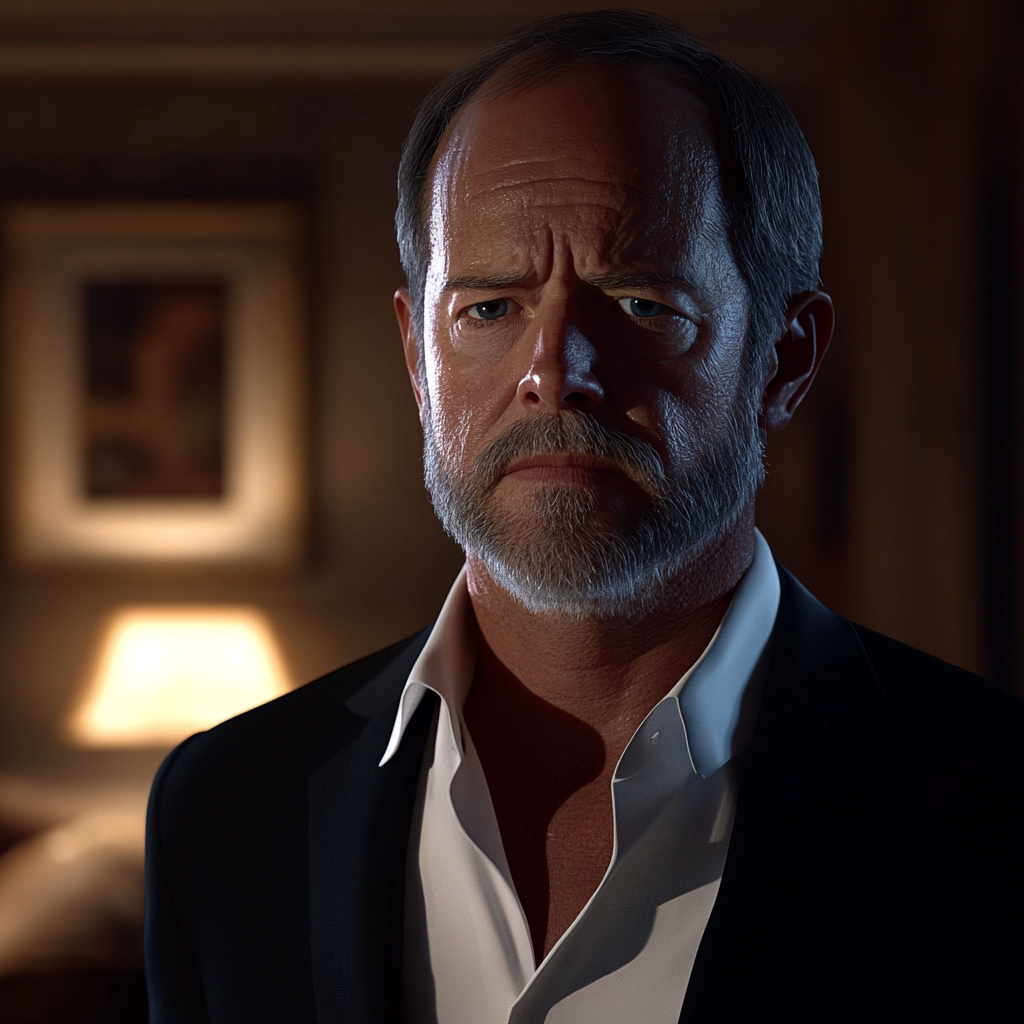
Um homem mais velho e severo | Fonte: Midjourney
Adam pegou a caixa de veludo da mesa e se ajoelhou na minha frente, seus olhos brilhando de emoção.
“Vamos tentar de novo”, ele disse, abrindo a caixa para revelar o anel de safira. “Case comigo… de novo?”
Eu ri em meio às lágrimas, estendendo minha mão esquerda trêmula. “Sim. Sempre sim.”
Ele deslizou o anel de volta no meu dedo, onde ele pertencia e onde ficaria.
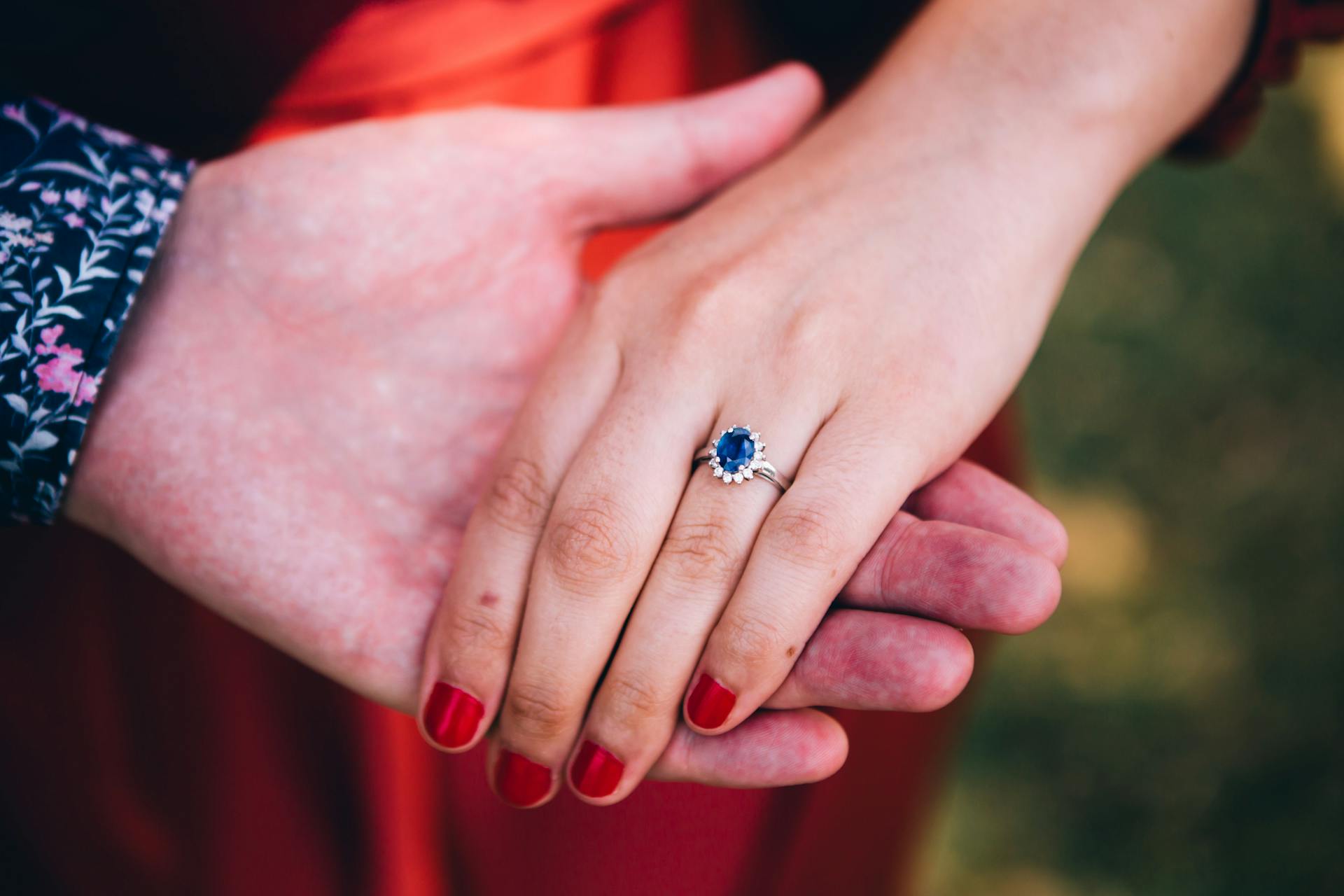
Close-up shot de um homem segurando a mão de uma mulher | Fonte: Pexels
“Sinto muito”, Adam sussurrou, pressionando sua testa contra a minha. “Eu não tinha ideia de que ela faria algo assim.”
“Não é culpa sua”, eu disse, apertando suas mãos com força. “Mas obrigada por me defender.”
Peter nos observou com um sorriso satisfeito. “Família significa aceitar as pessoas como elas são, não de onde elas vêm. Diane vai mudar de ideia eventualmente, mas até lá…”
“Até lá, temos um ao outro”, Adam concluiu, me fazendo rir.

Uma mulher emocional rindo | Fonte: Midjourney
Duas semanas depois, jantamos na casa dos pais de Adam novamente. Eu quase me recusei a ir, mas Adam insistiu.
“Não podemos evitá-los para sempre”, ele disse enquanto entrávamos na garagem. “Além disso, papai disse que mamãe tem algo a dizer para você.”
Meu estômago deu um nó enquanto caminhávamos até a porta, o anel pesado no meu dedo. Peter respondeu, me dando um abraço caloroso.
“Ela está na cozinha”, ele disse. “Vá com calma com ela. Ela está praticando seu pedido de desculpas o dia todo.”
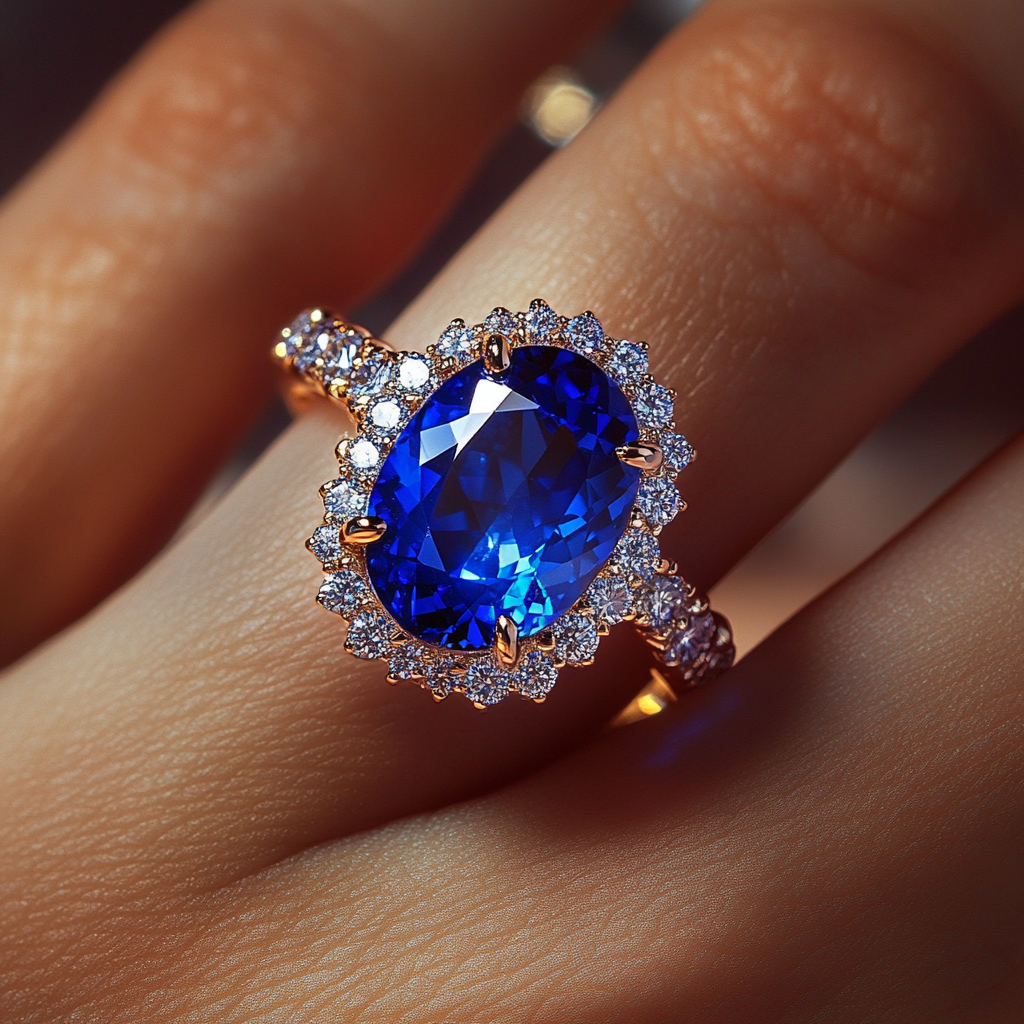
Foto em close de uma mulher usando um anel de safira deslumbrante | Fonte: Midjourney
Encontrei Diane arrumando flores no balcão, de costas para mim. Quando ela se virou e me viu, seus olhos imediatamente foram para o anel no meu dedo.
“Ficou bem em você”, ela disse depois de uma longa pausa.
Eu não respondi.
Ela suspirou, abaixando a tesoura. “Eu estava errada, Mia. O que eu fiz foi… foi imperdoável.”
“Então por que você fez isso?”
Os ombros dela caíram. “Porque eu fui egoísta. Porque eu pensei que aquele anel pertencia à nossa família, e eu…” Ela parou de falar, parecendo envergonhada.

Uma mulher mais velha culpada | Fonte: Midjourney
“E você não achou que eu era da família”, terminei por ela.
Ela assentiu, lágrimas nos olhos. “Eu estava errada. Peter não falou comigo direito em duas semanas, e Adam… bem, o jeito que ele olhou para mim quando descobriu…” Ela balançou a cabeça. “Eu não espero que você me perdoe imediatamente. Talvez nunca. Mas eu sinto muito.”
Estudei seu rosto, procurando por qualquer indício de insinceridade. “Não vou devolver o anel.”
Ela deu uma risada aguada. “Eu nem sonharia em perguntar. É seu, justo e honesto.” Ela hesitou, então acrescentou, “E assim é seu lugar nesta família.”

Uma mulher mais velha aliviada rindo | Fonte: Midjourney
No jantar, a tensão diminuiu gradualmente. Diane fez um esforço visível para me incluir na conversa, perguntando sobre meu trabalho e meus pais. Mais tarde, enquanto ajudávamos a limpar a mesa, ela parou ao meu lado.
“Eu estava pensando”, ela disse, sua voz baixa para que só eu pudesse ouvir, “talvez você gostaria de ver algumas das outras peças da família algum dia. Há um lindo colar que combinaria com seus olhos.”
Eu levantei uma sobrancelha, surpresa. “Talvez um dia. Quando nós dois queremos dizer isso.”
Ela assentiu, entendendo o limite que eu estabeleci. “Quando você estiver pronta.”
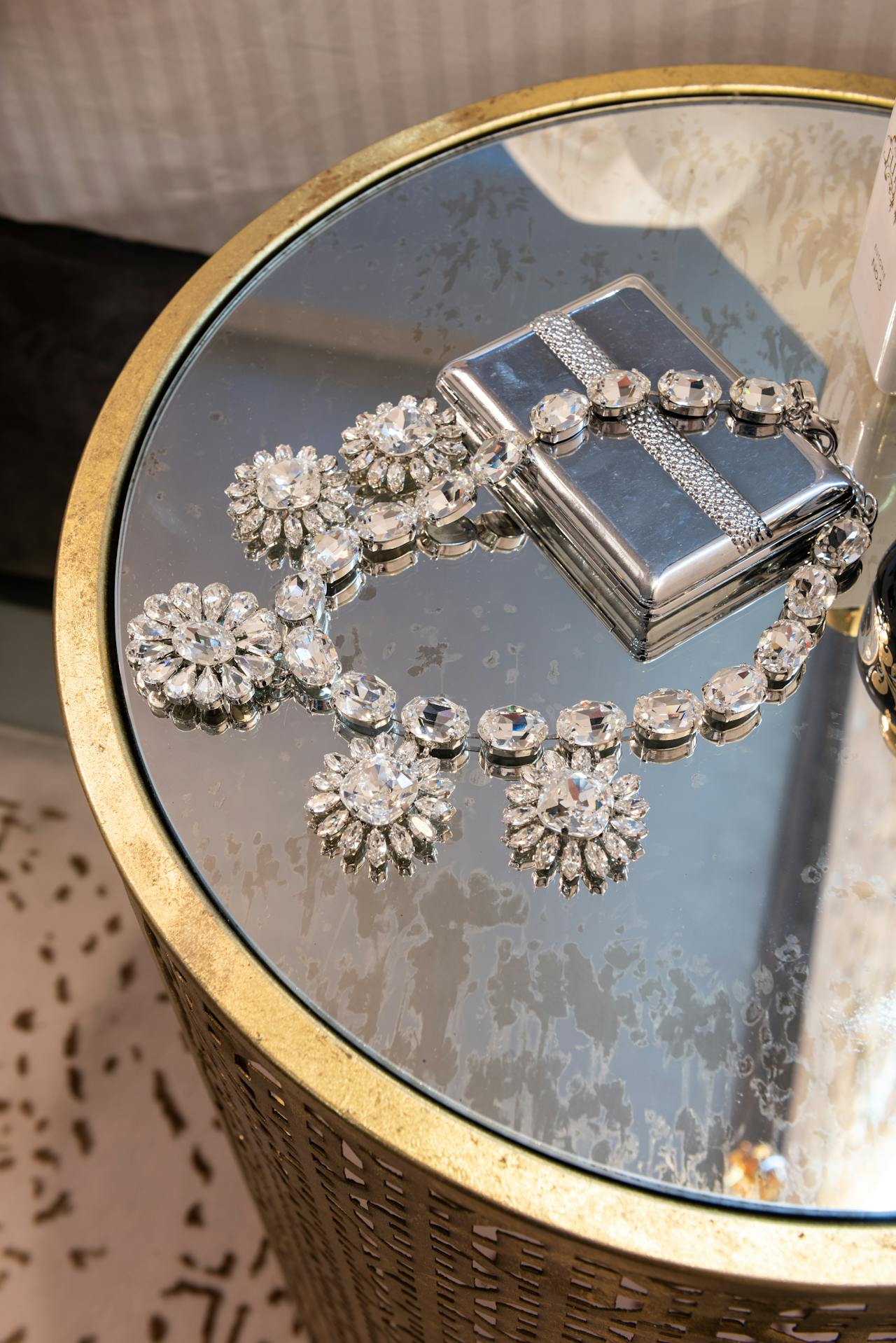
Um colar de diamantes sobre uma mesa | Fonte: Pexels
Diane nem sequer olhou para meu anel desde aquela noite. E quanto a Peter, ele é definitivamente meu cunhado favorito agora.
Na semana passada, ele me deu um álbum de fotos antigo, cheio de fotos da infância de Adam e imagens do anel nos dedos das mulheres ao longo da história da família.
“Para seus filhos algum dia”, ele disse com uma piscadela. “Para que eles saibam de onde veio.”
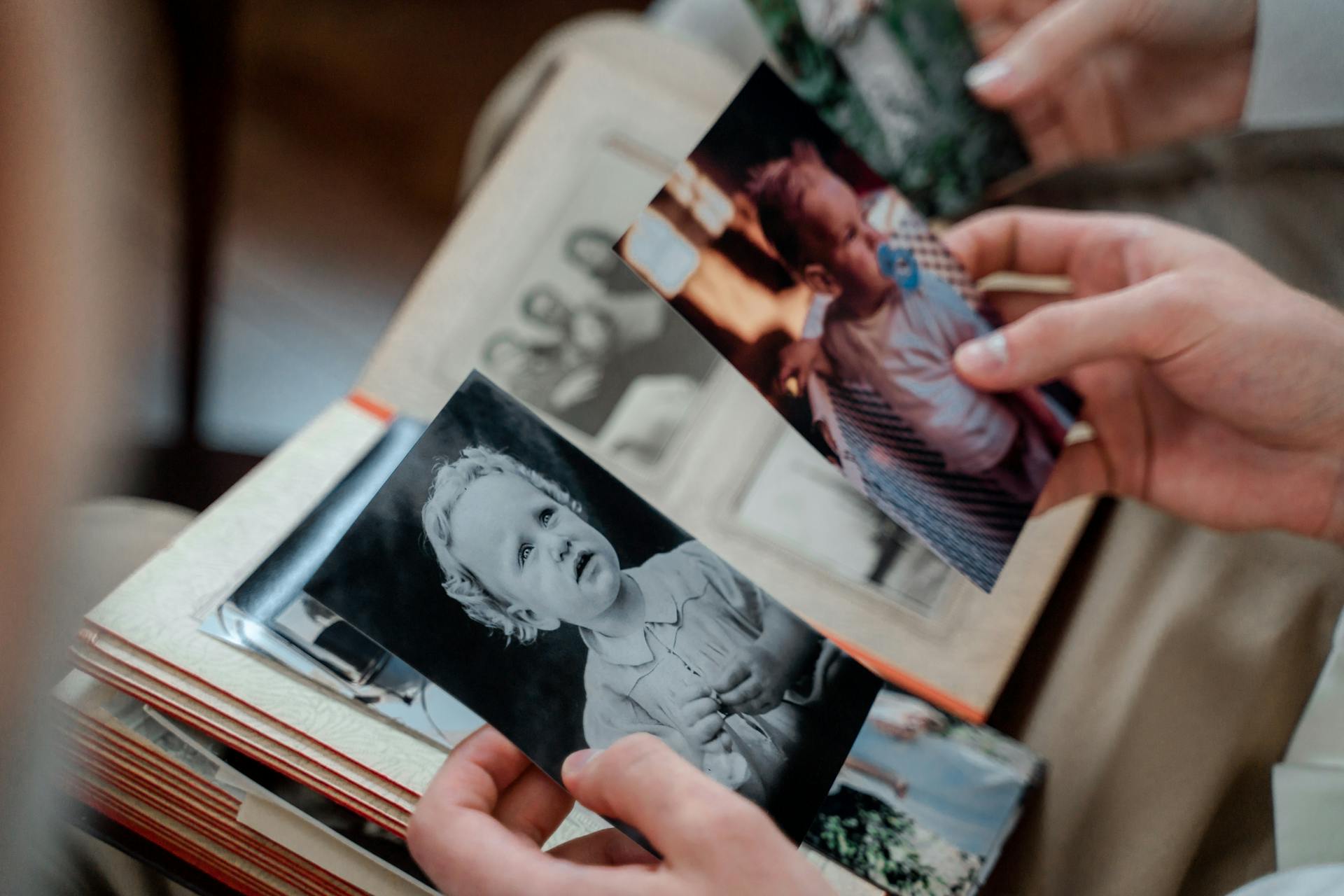
Uma mulher olhando fotos de família em um álbum | Fonte: Pexels
Adicionei minha própria foto à coleção — um close da minha mão segurando a de Adam, com a safira refletindo a luz.
Este anel me pertence. Não porque alguém decidiu que eu era digno o suficiente para usá-lo, mas porque o amor o tornou meu. Da mesma forma que o amor, não o sangue, faz uma família.
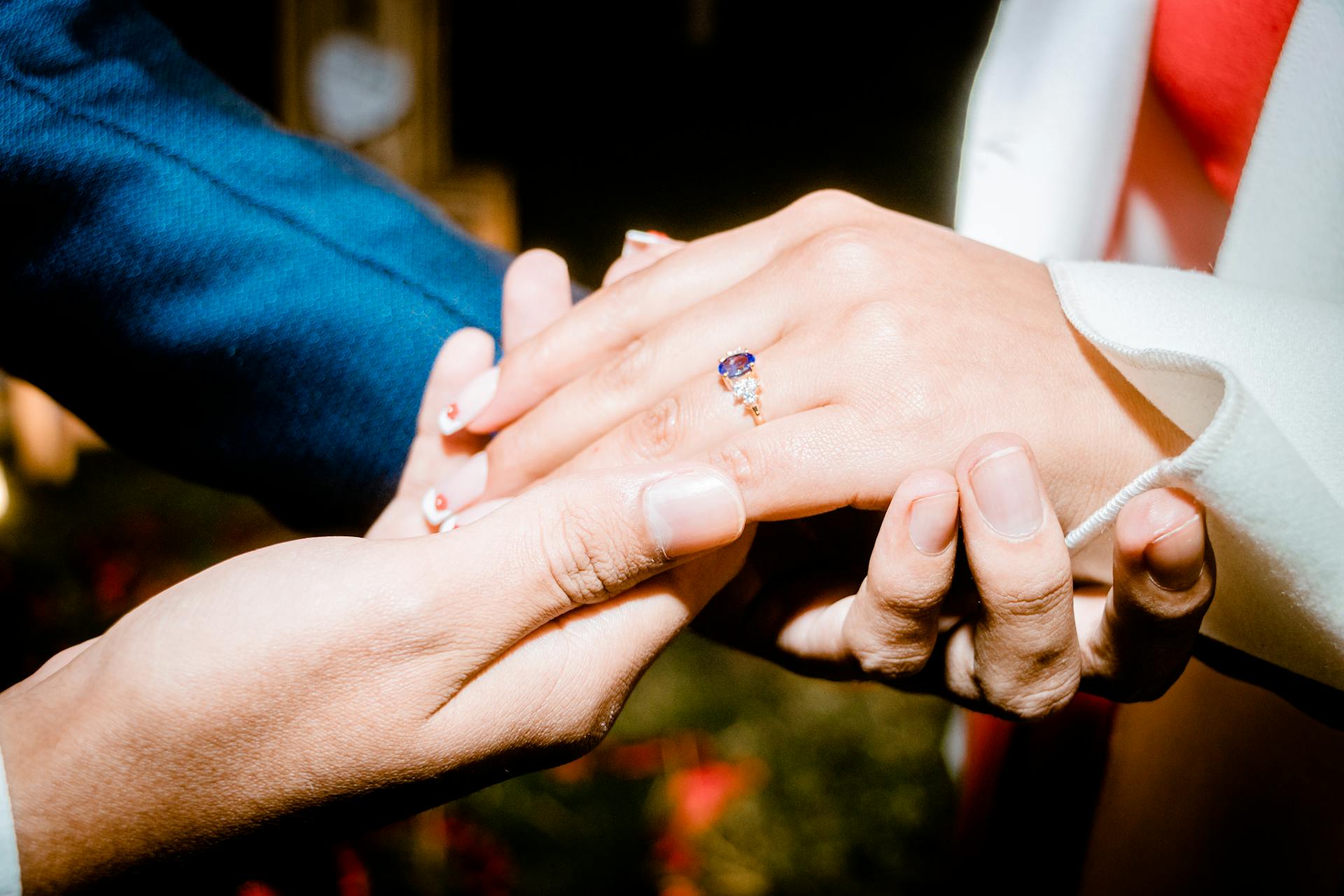
Um homem segurando a mão de uma mulher | Fonte: Pexels
Perder meu marido me quebrou, mas a mãe dele piorou tudo. Dois dias depois do funeral, ela nos expulsou e trocou as fechaduras, achando que tinha vencido. Ela não tinha ideia de que tinha acabado de cometer o maior erro de sua vida.
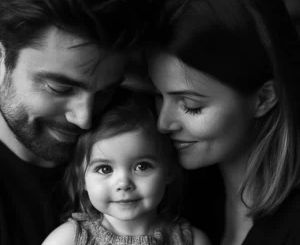

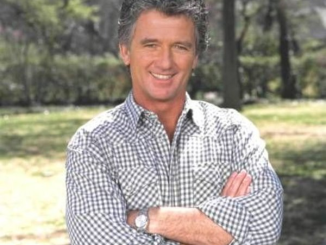
Leave a Reply